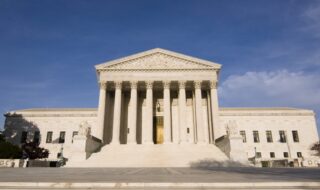July 14, 2021
U.S. Supreme Court Term Ends with Four Key Victories for Small Business
The U.S. Supreme Court’s 2020 term has concluded, and they won’t be hearing cases again until October. This past term witnessed major legal victories for small businesses. NFIB submitted several amicus briefs arguing for the rights of small businesses this term; In four of those cases, the Supreme Court’s decision aligned with NFIB’s amicus brief arguments.
“The U.S. Supreme Court is the last line of defense for small businesses and this term was a success for them and their daily operations,” said Karen Harned, Executive Director of the Small Business Legal Center (SBLC). “Small businesses are constantly dealing with ever-changing business laws and regulations, and these decisions will make it a little easier for owners to run their business.”
CIC Services v. Internal Revenue Service. On May 17, the U.S. Supreme Court unanimously ruled that small business owners can now challenge IRS tax regulations they believe are legally suspect in court before they must pay a tax penalty. The SBLC previously filed an amicus brief supporting CIC Services’ lawsuit against the IRS.
The case concerned a clause in the Anti-Injunction Act (AIA), which bars the use of lawsuits to restrain the assessment or collection of taxes. The IRS attempted to use the AIA to bar pre-enforcement challenges to their regulatory mandates, which the Court ruled was outside the scope of the act.
Cedar Point Nursery v. Hassid. On June 23, the U.S. Supreme Court held that small businesses have the right to exclude union organizers from entering their property and any such government-authorized physical invasion is a per se taking.
A California state regulation allowed union organizers to enter agricultural businesses’ property during specified times – without approval from or compensation to the owner. Plaintiffs argued that this regulation violated their property rights, constituting a physical taking under the Fifth Amendment. The SBLC joined the CATO Institute in filing an amicus brief in support of this claim. in support of this claim.
TransUnion LLC v. Ramirez. On June 25, the U.S. Supreme Court reversed the Ninth Circuit’s decision that individuals can be certified for a class-action lawsuit even when they suffered no actual injury. In doing so, the Supreme Court held that all members of the class must suffer a “concrete harm” in order to have standing to sue.
NFIB applauds this decision, as the SBLC filed an amicus brief arguing for this result.
Americans for Prosperity Foundation v. Bonta. On July 1, the U.S. Supreme Court struck down California’s requirement that nonprofit organizations disclose the names and addresses of people who donated above a certain dollar amount. The Court held that this violated the donors’ First Amendment rights.
Previously, the Ninth Circuit Court upheld the requirement, but the U.S. Supreme Court concluded that the rule imposed a “widespread burden on donors’ associational rights”. The SBLC filed an amicus brief alongside the Hispanic Leadership Fund and the National Association of Home Builders (at the time the case was referred to as AFP v. Becerra, but it was consolidated with a similar case, Thomas More Law Center v. Bonta.)
The?SBLC?serves as?the voice for small businesses?in?all?the nation’s courts, not just the Supreme Court. It is also a?legal resource, assisting?small business owners?in learning about their rights. Learn more at?NFIB.com/Legal.
Take action:?Tell?NFIB?how overzealous regulations have affected your business?by?completing NFIB’s brief survey here.
NFIB is a member-driven organization advocating on behalf of small and independent businesses nationwide.
Related Articles














